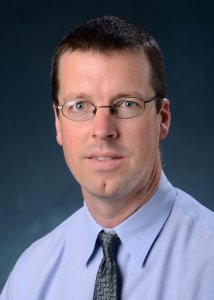Presented By: Aerospace Engineering
AE585 Graduate Seminar Series - Coordinated Persistent Airborne Information Gathering: Cloud Robotics in the Clouds
Eric Frew, Associate Professor, University of Colorado Boulder

Eric Frew, Associate Professor, University of Colorado Boulder
Fixed-wing aerial robotic technology has advanced to the point where platforms fly persistent sampling missions far from remote operators. Likewise, complex atmospheric phenomena can be simulated in near real-time with increasing levels of fidelity. Furthermore, cloud computing technology enables distributed computation on large, dynamic data sets. Combining autonomous airborne sensors with environmental models dispersed over multiple communication and computation channels enables the collection of information essential for examining the fundamental behavior of complex environmental phenomena. Dr. Frew will describe progress made over the last decade developing software algorithms and hardware systems for coordinated persistent airborne information gathering. Applications that will be discussed include targeted observation of supercell thunderstorms and tornado formation, persistent sampling of atmospheric fronts for severe storm forecasting, and cooperative control for detecting, localizing, and tracking radio emitters.
About the speaker...
Dr. Eric W. Frew is an associate professor in the Ann and H.J. Smead Aerospace Engineering Sciences Department and Director of the Autonomous Systems Interdisciplinary Research Theme (ASIRT). Dr. Frew has been designing and deploying unmanned aircraft systems for over twenty years. His research efforts focus on autonomous flight of heterogeneous unmanned aircraft systems; distributed information-gathering by mobile robots; miniature self-deploying systems; and guidance and control of unmanned aircraft in complex atmospheric phenomena. Dr. Frew was co-leader of the team that performed the first-ever sampling of a severe supercell thunderstorm by an unmanned aircraft.
Fixed-wing aerial robotic technology has advanced to the point where platforms fly persistent sampling missions far from remote operators. Likewise, complex atmospheric phenomena can be simulated in near real-time with increasing levels of fidelity. Furthermore, cloud computing technology enables distributed computation on large, dynamic data sets. Combining autonomous airborne sensors with environmental models dispersed over multiple communication and computation channels enables the collection of information essential for examining the fundamental behavior of complex environmental phenomena. Dr. Frew will describe progress made over the last decade developing software algorithms and hardware systems for coordinated persistent airborne information gathering. Applications that will be discussed include targeted observation of supercell thunderstorms and tornado formation, persistent sampling of atmospheric fronts for severe storm forecasting, and cooperative control for detecting, localizing, and tracking radio emitters.
About the speaker...
Dr. Eric W. Frew is an associate professor in the Ann and H.J. Smead Aerospace Engineering Sciences Department and Director of the Autonomous Systems Interdisciplinary Research Theme (ASIRT). Dr. Frew has been designing and deploying unmanned aircraft systems for over twenty years. His research efforts focus on autonomous flight of heterogeneous unmanned aircraft systems; distributed information-gathering by mobile robots; miniature self-deploying systems; and guidance and control of unmanned aircraft in complex atmospheric phenomena. Dr. Frew was co-leader of the team that performed the first-ever sampling of a severe supercell thunderstorm by an unmanned aircraft.